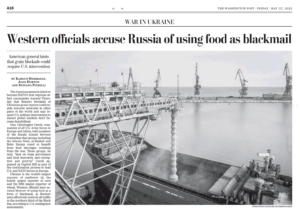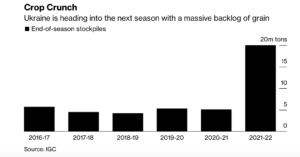A prolonged military conflict in the Middle East could potentially upend key commodity markets due to Iran’s control of the Strait of Hormuz, one of the world’s most important trade…
Russia’s Blockade of Ukrainian Grain, “May Require U.S. Intervention, General Suggests”
Karoun Demirjian, Alex Horton and Stefano Pitrelli reported in today’s Washington Post that, “The American general slated to become NATO’s next supreme allied commander warned Thursday that Russia’s blockade of Ukrainian grain exports could enable terrorist networks in other parts of the world and may require U.S. military intervention to ensure global markets don’t become destabilized.

“Gen. Christopher Cavoli, commander of all U.S. Army forces in Europe and Africa, told members of the Senate Armed Services Committee that groups including the Islamic State, al-Shabab and Boko Haram stand to benefit from food shortages resulting from the war. Those groups, he said, ‘feed on weak governance and food insecurity and corruption and poverty.’ Cavoli appeared on Capitol Hill as part of the confirmation process to lead U.S. and NATO forces in Europe.”
Today’s Post article stated that,
There were mixed signals Thursday over Russia’s willingness to release any of the wheat now at risk of rotting while it sits on commercial vessels unable to depart Ukraine’s seaports.
“The Kremlin’s spokesman, Dmitry Peskov, said no ships carrying Ukrainian grain would be allowed to leave until Western governments lift their sanctions on Russia. Hours later, Italian Prime Minister Mario Draghi told reporters that, in a call, Russian President Vladimir Putin had agreed in principle to liberate several million tons. A Kremlin readout of the leaders’ conversation did not go that far.”
Demirjian, Horton and Pitrelli indicated that, “Draghi, the Italian premier, said during a news conference that he decided to call Putin because ‘millions and millions of lives are at stake.’ The Russian leader, he said, blames Ukraine for blocking its seaports by laying floating mines to stave off attack. The proposal involves a collaboration between Russia and Ukraine, ‘on the one hand on demining, and on the other on guaranteeing’ that no attacks are launched while the operation is being carried out, Draghi said, adding that he intends to inquire with Kyiv whether Ukrainian President Volodymyr Zelensky would support such an arrangement.
“In his Senate testimony, Cavoli hinted that, at some point, the U.S. military could get involved in an effort to guarantee that exports from Ukraine can resume. But he declined to say whether he would recommend such an approach if he is confirmed to take over at NATO, apart from preparing the options requested by civilian leaders.
“For now, he said, ‘it’s going to be a combination of modes of transportation that we’re going to have to use’ to get around Russian efforts to stymie grain shipments from leaving Ukraine. Romania has already made the Black Sea port of Constanta available to exports of Ukrainian grain, though Cavoli noted that accounts for only about 90,000 tons a day. About 22 million tons remain backed up in Ukraine, he said.”

The Post article added that, “Pentagon spokesman John Kirby, speaking to reporters later Thursday, said ‘there are no plans to use the United States military, or military sources or assets, to assist in the movement of grain outside of Ukraine.’ The Biden administration, he added, is ‘in discussion with our international partners and allies about how best to address this.'”
Reuters writer Steve Holland reported yesterday that, “The White House said on Thursday there were no talks being held about relaxing sanctions on Russia in order to get grain exports.”
Meanwhile, Reuters News reported today that, “Russia, one of the world’s largest wheat exporters, will have 50 million tonnes of grain available for export in the new July-June marketing season, up from more than 37 million tonnes in the current season, its agriculture minister said.”
In other developments, Reuters writer P.j. Huffstutter reported yesterday that, “The U.S. government will let some farmers plant crops on environmentally sensitive land that had been set aside for conservation, in an effort to help mitigate the global food crisis, the Department of Agriculture (USDA) said on Thursday.
“The offer is open to farmers in the final year of their contract with the agency’s Conservation Reserve Program (CRP), USDA said on its website. The program pays farmers to fallow acres under 10- or 15-year contracts.”
And Bloomberg writer Elizabeth Elkin reported yesterday that, “Fertilizer prices that had hit records are now plunging as buyers reel from sticker shock.
“The June spot price in Tampa, Florida for the nitrogen fertilizer ammonia settled at $1,000 per metric ton, a drop of 30% from May’s $1,425 per metric ton, according to Green Markets, a Bloomberg company.”
“Even with the drop, however, prices are still 87% higher than a year ago, and supply chain issues continue to wreak havoc on global markets,” the Bloomberg article said.





